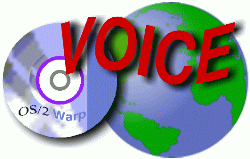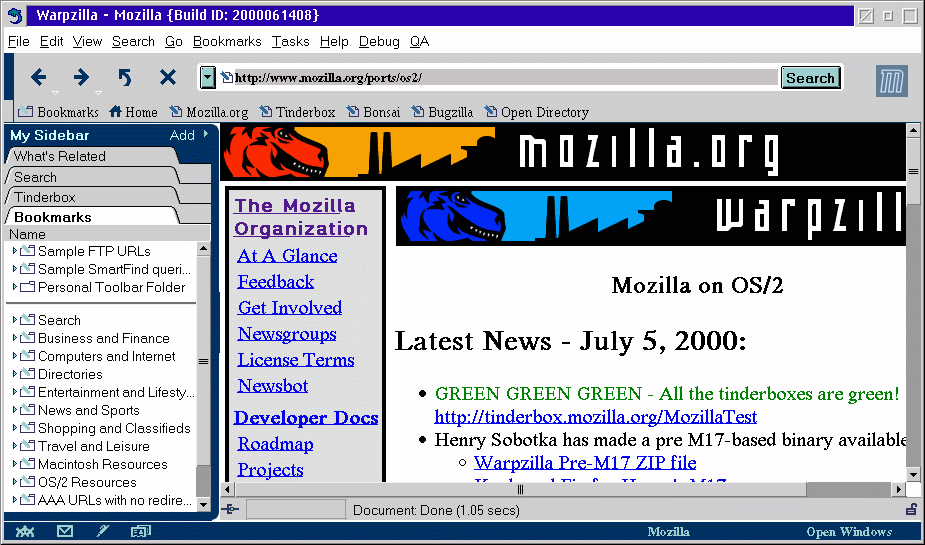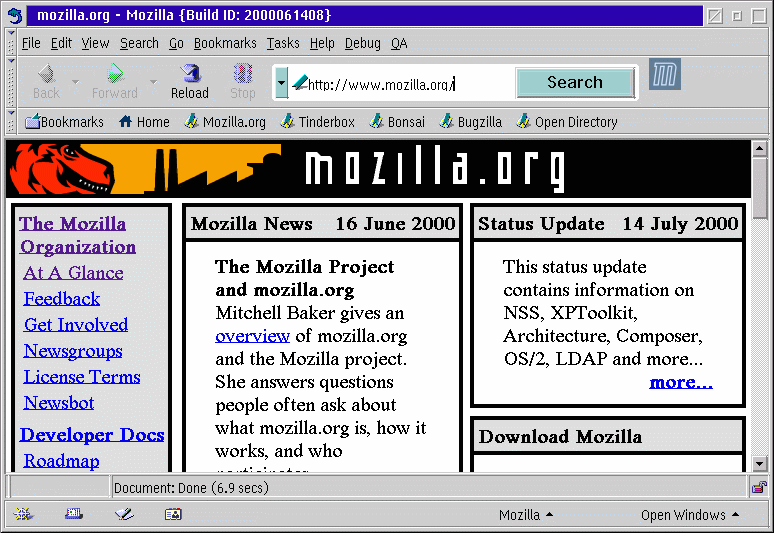 VOICE Home Page: http://www.os2voice.org |
[Previous Page] [Next Page] [Features Index] |
 VOICE Home Page: http://www.os2voice.org |
[Previous Page] [Next Page] [Features Index] |
By Timothy
Howe ©August 2000The Mozilla Organization: http://www.mozilla.org |
This brings me to the Warpzilla project.
Warpzilla is the effort to build a new browser for OS/2 based on the new Mozilla.
Some OS/2 users may have tried the M7 build (I had limited success with it), but
it wasn't what I would call useable. The M16, and now M17 builds are a different
story. Lots of work has been done while I wasn't paying attention. I've gotten pretty
excited about it from a users perspective; the Warpzilla team is making fast progress
now. I'm also impressed from a hacker's perspective; the XML based user interface
architecture should make it easy for the OS/2 community to get involved with Warpzilla's
future development.
Warpzilla as a product will include all the latest browser features that Mozilla
has to offer: a first rate rendering engine with support for XML , Cascading Style
Sheets, and HTML 4. In other words, Warpzilla will have all the cutting edge technologies
that will make the Internet a richer medium for communication and expression. Also
included is an e-mail client, a news client, an HTML composer, and even an IRC client!
At first glance this puppy looks pretty different from past versions of Navigator.
It's hard to tell where the web pages end and the browser window begins sometimes.
You will also notice the "Sidebar" on the left side of the window. This
offers shortcuts and quick looks at almost anything you want. The Sidebar is meant
to be completely customizable.

If the appearance of Warpzilla throws you off a bit, don't worry; you can change
it. Mozilla is meant to be customized using skins in the same manner as PM123. When
you install you have the choice of using the Classic skin which will make Warpzilla
look much like Communicator 4.61 for OS/2. I also got the Sidebar out of my way
and found myself looking at a pretty face.

As you jump around the web with Warpzilla, you're going to notice that, at this
time, the interface is still a bit flakey. Hopefully, you will also notice how much
faster the Mozilla engine renders html. I've found a few little problems with the
way the current Pre-M17 release displays tables, but I'm sure this will be fixed
as development on the engine advances. My advice to everyone is to download the
latest binaries and take it for a spin.
But who is behind the Warpzilla project? The "Port Owner" is none other
than Mike Kaply who helped bring us Netscape Communicator for OS/2. In fact, IBM
seems to be rather involved. The Warpzilla Tinderboxes, the machines used for building
and testing Mozilla Ports, were donated by IBM. Jeff Kobal of IBM is also a key
developer along with Henry Sobotka, the busiest non-IBMer of the team. I managed
to catch Mike Kaply in the Warpzilla IRC channel (irc.mozilla.org, #Warpzilla) where
discussions take place every Tuesday at 7pm Central (0:00 GMT).
MKaply: Our current plan is to create a Mozilla derivative browser with anMe: What is your personal involvement?
IBM brand. Similar to how Netscape is taking Mozilla and creating its own
branded browser...
We are also taking a very active role in the open source version of
Warpzilla - we are working on bug fixes, build instructions, etc...
We plan to have a very active role in the open source version of
Mozilla. In no way will an IBM branded Mozilla browser preclude our
participation in the open source side of things.
That IBM branded browser, by the way, is an OS/2 only statement.
MKaply: I am one of two technical leads on the project - Jeff Kobal is the other...Me: What do you see as the most challenging part of bringing the Mozilla code to OS/2?
I am coordinating lots of things, but I am primarily responsible for
checkins and publishing documentation
I am also the official OS/2 port owner from a Mozilla point of view.
As things progress, I will be doing lots more coding :)
MKaply: I think it is the fact that a lot of work was done at the M7 levelMe: Have you had any success in getting outside coders to contribute? Also, have the differences in the gcc compiler and VAC++ 4.0 made programmers wary?
with a lot of assumptions...
and we have to pull the code forward so that we can get things working...
but in the meantime, we have found that lots of code is missing, and lots
of things [have] changed.
The build took a while, but we are pretty much there now and now we can
concentrate on the code.
The other challenge is going to be getting outside people to help :)
We really want to get the participation of the OS/2 community.
MKaply: Henry Sobotka is our main outside contributor and he has done an outstanding job.Me: Do you have anything you would like to say to the OS/2 community about Warpzilla, or anything to tell potential contributors?
There have been a few other people who are just starting to try to build it.
We are not using VAC++ 4.0, we are using VAC++ 3.6.5
I don't think the differences have made programmers wary, I think it is just a
matter of what you own as well as preference.
The main differences from a Mozilla point of view are that the VisualAge version
can be easily source level debugged.
But it takes longer to [compile].
The gcc is obviously free, so that is an advantage.
In the past, the split has been about 50/50 between people who want to use GCC and
people who want to use VisualAge.
MKaply: For the OS/2 community, I would say not to worry about the official release - Use WarpzillaMe: Will there be any features missing in Warpzilla that will be available in Netscape 6? Will there be any OS/2 specific enhancements?
And as far as contributors, just that we really want people to participate, especially coding.
MKaply: It's very important to distinguish between Netscape [6] and Mozilla...Mike also made the point that Mozilla includes an IRC client that won't be in Netscape 6.
Netscape 6 will have AOL Instant Messenger integration, spellchecker, ability to check AOL mail.
Mozilla will not have these features because they are not open source...
Because Warpzilla is Mozilla, it will not have these features.
We plan to do normal OS/2 integration, but special OS/2 stuff is up to the OS/2 community.